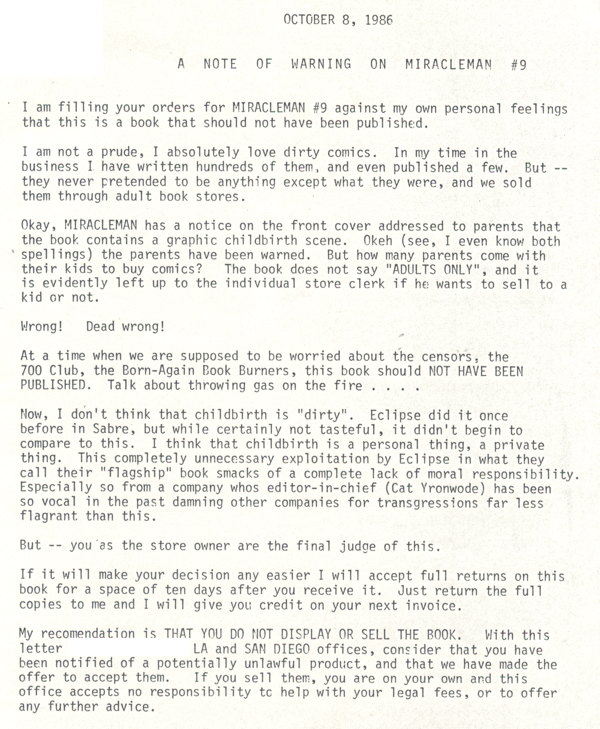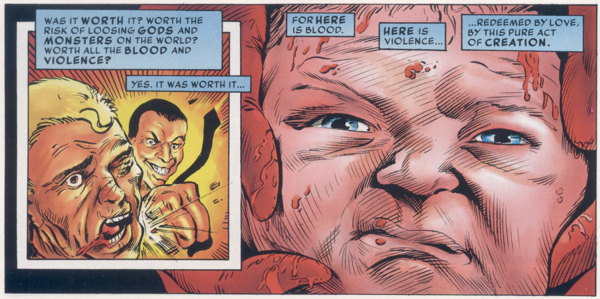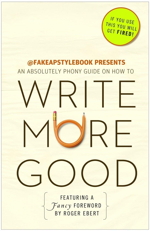“My recommendation is THAT YOU DO NOT DISPLAY OR SELL THE BOOK.”
Quite a while ago I came across a couple of mid-1980s distributor memos to retailers in regards to the release of Miracleman #9, a comic that contained explicit scenes of childbirth. Given that today is the release of Marvel’s reprint of said comic, I thought I’d present them here, in slightly redacted form, to give you a bit of a historical perspective on this comic’s initial release. Some very telling details in here about the sort of things the industry was worried about at the time, and an interesting footnote in the then-raging debate about comics content-labeling and ratings systems:

Clearly this didn’t sit well with certain concerned parties, resulting in this follow-up memo:

Of course, this particular distributor wasn’t alone, in that Diamond Comics also had some objections to the book.
In my particular case, I was still at the time just barely a minor, but “just barely” is still “not old enough,” given that the local funnybook store did indeed restrict sales of Miracleman #9 to adults. But, unlike as is implied in the first memo, my dad did come with me to buy comics, so I was able to purchase said issue. Actually, I had to come back with my dad, since I wasn’t allowed to buy it during my first visit that week. Imagine having to wait so long for a new issue of Miracleman to come out, particularly since the previous issue was a fill-in containing 1950s reprints, only to be told “sorry, kid, gotta be this tall to get on the ride.”
Not complaining, mind you. There was a feeling of “they’re coming to get us!” prevalent at the time, as the industry’s rising visibility from high-profile projects like Watchmen and The Dark Knight Returns eventually increased the number of “do you know what your kids are reading?” exposés from people eager to blame problems on easy targets (cf. rock ‘n’ roll, video games, short skirts, fire, the wheel) and folks were just straight up afraid. A little precaution, such as the shop restricting sales on MM #9 to adults, wasn’t out of line. I still do so at the shop if necessary now that I’m the dude making the decisions, though to be honest it’s rarely a problem. Kids aren’t looking for Avatar books, by and large, so I’m not bagging and tagging them “ADULTS ONLY” and pasting them to the wall. (Though, frankly, most issues of Crossed make that birth issue of Miracleman look like Richie Rich.)
The Avatar comparison isn’t exactly analogous, of course. It’s not like all the previous issues of Crossed were all ages or rated Teen Plus or whatever and then suddenly here’s an issue with pages of close-ups of [REDACTED] being jammed into [REDACTED] while cascades of [REDACTED] pour out of [REDACTED]. It’s more like, I don’t know, here’s a new run of Spider-Man and then suddenly issue #10 is the all Topless Mary Jane issue. Or something. You know what I mean. But it’s funny, and certainly clichéd to point out, that the violence in the previous issues didn’t warrant all this fretting, but the non-violent birth scenes did. The contrast of that violence with this birth is the very point of the story:

And yes, it’s easy in hindsight to sort of mock the reactions (or overreactions) from distributors at the time, especially since, as far as I can recall, there wasn’t much or any (or at least any widespread) objection to Miracleman #9 from “the real world” back then. Of course, there’s still some worry, now as then, otherwise Marvel wouldn’t have started polybagging their reprints months ago to keep this specific issue from standing out as anything special, no need to look, nothing to see here, officer. But if this were a perfect world, a comic book legal defense fund wouldn’t need to exist.







And of course the funny part is that Moore’s run on series would end with perhaps the single goriest sequence in superhero history, and MIRACLEMAN #15 did not have a warning label on it.
Wasn’t this *after* Marvel scrubbed a birth scene panel from Ka-Zar?
“Okeh”?
On the one hand, the chap’s concerns are somewhat understandable as you say. On the other, he sends out notices saying DO NOT SELL OR DISPLAY THIS and then acts incredibly offended and defensive that the publisher was irked about a distributor actively telling dealers not to buy or sell their product. “Fine, I’ll never mention you again, how do you like them apples?”
Of course, this is tame compared to what would have happened if the Internet had existed then.
My thoughts on the lack of coverage of this week’s reissue by Marvel:
http://comicbookgalaxyblog.blogspot.com/2014/08/galaxy-newsbrief-080714-reporting-on.html
PS to Synonymous: “Okeh” is an antiquated spelling of “okay.” It comes in handy in playing Words With Friends.
So, yeah, this guy’s “hair on fire” approach is a little lulz-worthy. I have to admit, though, I’ve found myself doing double takes recently a couple of times in local comics shops, not so much because I think that certain items shouldn’t be sold, but because I question how they are shelved/displayed in a way that seems to draw kids’ attention. Once was on Free Comic Book Day when a copy of a “Hentai Hotties” anime DVD was on display right behind the artists doing sketches for kids. Ahem. The other was when I saw the Image “Sex” title shelved on a low shelf (eye-level for 6-7 year olds, probably), adjacent to all the superhero shenanigans books, with no signage or indication that you might be veering into less family-friendly waters. Just seemed to be inviting trouble, somehow, or at least some unexpected conversations for an unwitting parent.
Which makes me wonder, Mike–how *do* you display the more adult-themed titles you sell? Am I being overly cautious in my concerns?
I never saw the image/scene in question (While old, I am apparently not old enough, and just missed it the firs time around).
How different is it than the image of Prince Robot’s son being born in a recent issue of SAGA (other than being a human birth, instead of a gray-skinned, blue-fluid-filled royal robot birth, of course)…?
” (Though, frankly, most issues of Crossed make that birth issue of Miracleman look like Richie Rich.)”
You ain’t even kidding!
“Prince Robot’s son being born ”
HA! That first page, I didn’t even know what I was looking at, at first. It was so out-of-context for comics, for me not being familiar with the book, for it being a TV-HEADED ALIEN, etc.
“Topless Mary Jane issue”
THAT I’d buy!
“with this birth”
LAWD, that’s an ugly baby!
“distributor memos ”
Don’t you LOVE how he claims he’s NOT A PRUDE first? Is that a REQUIREMENT in those kind of comments?
ADD: So I gathered, but as someone who lived through the mid-80’s, I think it was antiquated even then.
Yes, it definitely was.
I recall getting the issue at the time and knowing there was some controversy surrounding it, but being more annoyed that it is, in essence, a long series of splash panels and thus a fairly short story (although the ending was a kicker).
It’s not presented particularly sexy…it’s a realistic depiction of childbirth, complete with blood and such. There is a realistic depiction of female genitalia, which is what this is all really about.
And let’s be clear, here: no one made any fuss about Miracleman graphically murdering his creator. No one said ‘don’t stock that issue with an attempted bathroom rape’. There wasn’t an outcry about Gargunza serially raping Miraclewoman or any of a number of ugly elements.
I mean, I get what the distributor was saying…and certainly comics were just then getting to that stage where boundaries were being tested. I was in college when this issue came out and remember it more for the outrage that never happened than anything else.